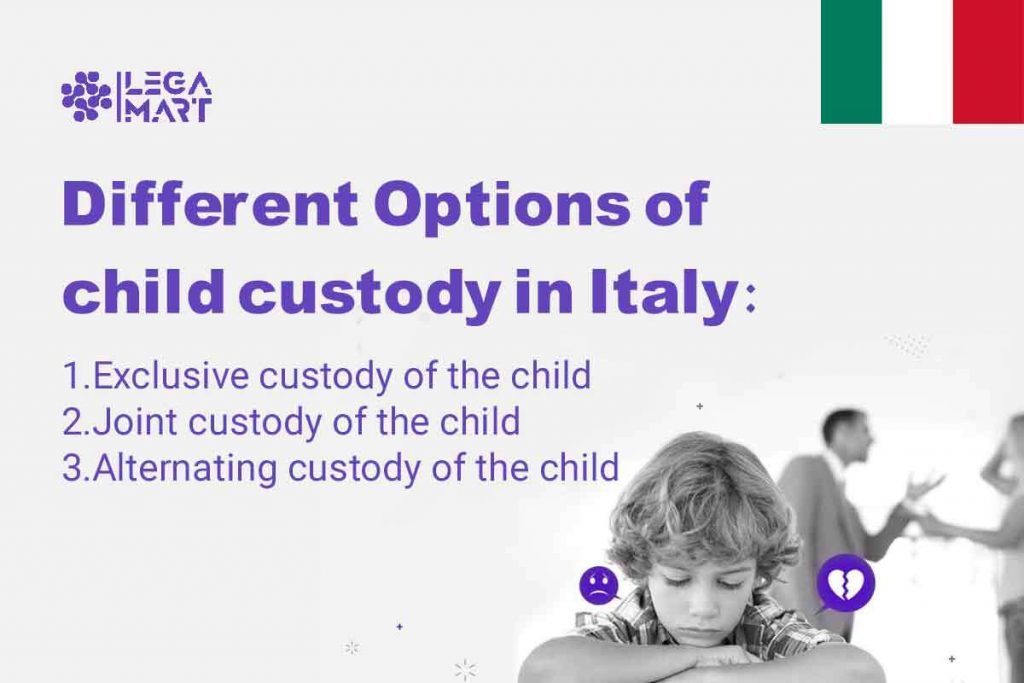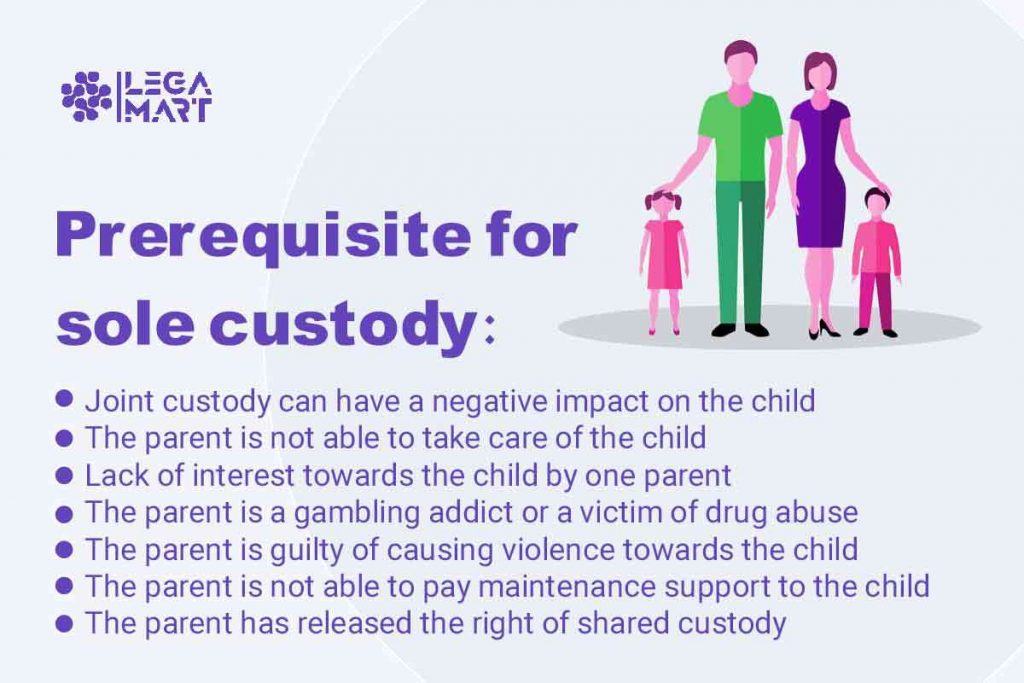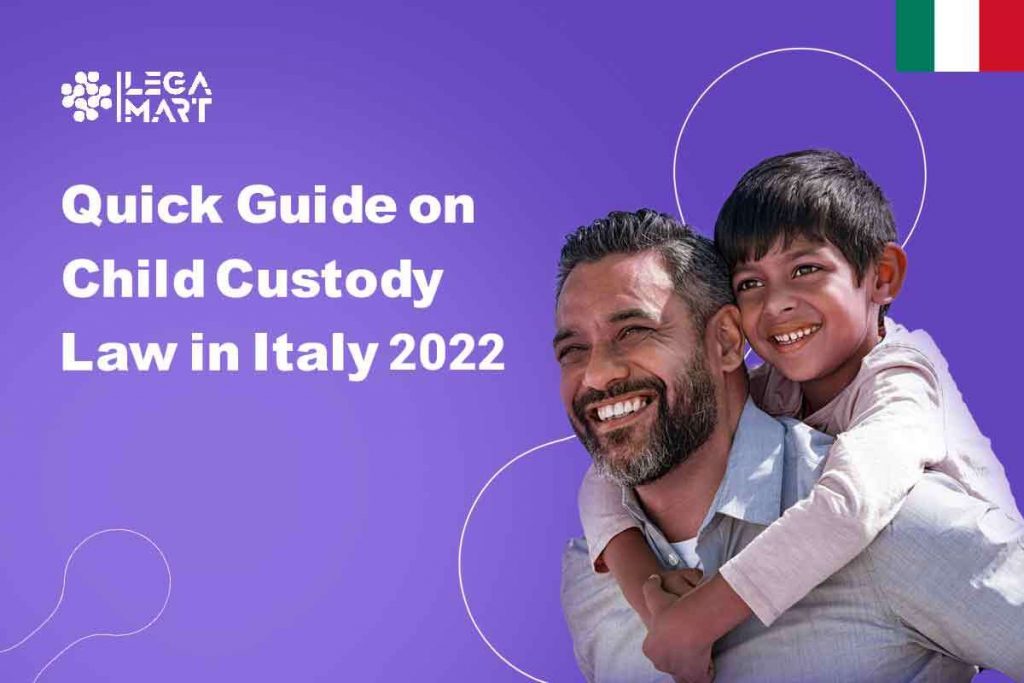- Introduction
- Jurisdiction and General law
- Factors for awarding child custody
- Child custody law in Italy
- Different Options of child custody in Italy
- Joint custody in Italy
- Child custody law in Italy for physical custody of the child
- Maintenance of the child
- Assignment of the family house
- Sole custody in Italy
- Alternating Custody in Italy
- Child custody law in Italy for unmarried couples
- Jurisdiction in cases concerning the custody and maintenance of children of international couples
- Conclusion
- Frequently Asked Questions
Introduction
A significant issue that arises after the divorce or separation of a couple is the custody of the child. A child has to suffer mental and emotional stress during a divorce. Depending on the circumstances, parents may be given full legal custody or even have their parental rights terminated. After a divorce or separation, three rights are associated with the child: custody of the child, visitation rights of the parent, and residence of the child. If you want to apply for the custody of a child in Italy, you should be well-versed in the child custody law in Italy. This article will discuss in detail the child custody law in Italy.
Jurisdiction and General law
Deciding on the custody of the child is not much complicated if both parents are living in Italy. If the parents are living in different countries, jurisdiction on parental responsibility is vested in the Courts of the Member State where the child is habitually resident at the time of application for child custody. The criterion of habitual residence is referred to in the 1996 Hague Convention on Jurisdiction, Applicable Law, Recognition, Enforcement and Cooperation in respect of Parental Responsibility and Measures for the Protection of Children. Article 8 of the Brussels II Regulation defers jurisdiction to courts in the place where the child has a habitual residence.
Factors for awarding child custody
The factors mentioned in the child custody law in Italy for deciding the custody are stated below:
- The health of the parents
- The health of the child
- The lifestyle of the parents
- Abuse history of past records
- Choice of the minor if he is more than 12 years of age
- Parents’ ability to maintain the child
- The emotional bond between the parent and the child
The General Jurisdiction Court has jurisdiction over all proceedings concerning the custody of the children and any associated issues relating to parental responsibility.
Child custody law in Italy
Earlier, while deciding the custody of the child, the word “parental authority” was associated with the concept of custody. But the law reforming parenthood (Law No 219/2012) and Legislative Decree No 154/2013 replaced the word parental authority with parental responsibility. Law 54/2006 introduced joint custody of children in Italy.
According to this law, the default custody awarded by the court is joint parental custody. According to the child custody law in Italy mentioned in Article 337 quarter of the Civil Code, sole custody is only awarded when it is in the best interests of the child. As per Article 337-ter of the Civil Code, parental responsibility has to be exercised by both parents.
Different Options of child custody in Italy

There are mainly 3 different options for child custody in Italy:
- Exclusive custody of the child. This means that only one parent is granted custody of the child. The designated parents obtain the right to take important decisions in a child’s daily life and obtain complete parental responsibility for the child. Here, the other parent only has limited responsibilities, which are decided by the Italian court.
- Joint custody of the child. This agreement means that both parents have and must assume parental responsibilities for the child. This option respects the child’s interest to have contact with both parents, provided that the court sees both the parents as fit and proper persons to have custody of the child.
- Alternating custody of the child. This means that both parents obtain the right to have exclusive parental responsibility towards the child for a fixed period, depending on when custody is granted to them. Therefore, both parents have a predetermined time of custody.
Joint custody in Italy
It is also known as shared custody. In Italy, generally, the court prefers joint custody of the child after the separation or divorce of the parents. Both parents must take responsibility for the child. They should make decisions regarding the child’s education, health, growth, and nurture. Joint custody does not mean the child should spend equal time with both parents. The Courts try to achieve double parenthood so that it can benefit the growth of the child. The court will decide if both parents are fit, and if so, joint custody of the child will be given. In joint custody, the minor child has the right to receive care and attention from both parents.
Child custody law in Italy for physical custody of the child
Earlier, before the introduction of joint custody in Italy, the mother got physical custody, and the father was allowed to spend very little time with their child. But now, the courts prefer joint custody for better upbringing of the child. The parents may be awarded shared custody, but physical custody of the child may remain only with one parent.
Maintenance of the child
Earlier, the non-custodial parent had to pay child support for the care and nutrition of the child. But after introducing the 2006 Law, both parents were to pay child support after divorce or separation. The amount to be paid by each of them for child support is decided according to their income. The maintenance of the child is decided based on the following factors:
- The child’s actual needs
- The standard of living while the child was living with both parents
- The financial stability of both the parents
- The extent of the contribution made by each of the parents in terms of housework and childcare.
Assignment of the family house
Family house is where the family has spent most of the time before divorce or separation. The court has to decide the place of the child’s permanent residence while awarding joint custody in a divorce or separation proceeding. The child has the right to stay in the family house. A single place of residence will be chosen by the court so that it does not cause any hardship or separation from the parents. The other parent will have visitation rights over the child.
Sole custody in Italy
It is also known as exclusive custody. The Child Custody Law in Italy states that sole custody is to be awarded if joint custody is not in the best interest of the child. The parent with sole custody can take important decisions regarding the health and education of the child. The non-custodial parent will have minimum responsibilities towards the child. One parent will bear the burden of parental responsibility. The non-custodial parent can make a request to the court if he/she feels that the decisions taken were not in the best interest of the child.
Applying for sole custody of the child can be difficult. You need to present the case to the judge, who will decide the custody of the child based on the merits of the case. Thus it becomes crucial to know all the difficulties faced if you want to opt for sole custody of your child. So you must always consult a lawyer in Italy who is well-versed in child custody law in Italy and can help you with all your doubts or queries regarding custody of the child.
Legamart offers the best solution for your issues regarding custody of the child. They have a network of excellent lawyers who can advise you on all areas of family and children law, including custodial and non-custodial parental rights. Legamart also offers the translation of various documents into several different languages. You can also get your legal queries solved through Legamart. Depending upon your requirement, you can choose from a dozen of lawyers in the directory offered by Legamart.
Prerequisite for sole custody

Sole custody can be awarded by the court based on the child custody law in Italy. It can only be awarded due to the following reasons:
- Joint custody can have a negative impact on the child.
- The parent is not able to take care of the child.
- Lack of interest towards the child by one parent.
- The parent is a gambling addict or a victim of drug abuse.
- The parent is guilty of causing violence towards the child.
- The parent is not able to pay maintenance support to the child.
- The parent has released the right of shared custody.
Alternating Custody in Italy
This type of custody is rarely awarded by the courts. Each parent will have custody of the child for a predetermined time. The court will determine the time allotted to each parent in the best interests of the child.
Child custody law in Italy for unmarried couples
Whether couples are married or not, the child custody law in Italy remains the same. In the case of unmarried parents, an agreement is entered between the parents regarding the custody of the child. This agreement will determine the parental rights over the child. An application is to be made to the court to determine the validity of the agreement. The judge, after the acceptance of the agreement, will decide upon the residence and the visiting times of the child.
Jurisdiction in cases concerning the custody and maintenance of children of international couples
Numerous judicial rulings have discussed cases of separation under international law. One of the main cases (SS. UU. Cassazione sent. 17676/2016) dealt with the legal separation of Italian and British citizens. They had been married in Italy, and once problems arose, the mother returned to the UK with her son.
A Joint Session court declared that Italian jurisdiction exists for issues relating to legal separation, and foreign jurisdiction exists for minor children and their custody. It was held that the exclusive jurisdiction to hear claims concerning the child must be devolved to the court of the place where the child is habitually resident, even if such claims are brought jointly with the claim for the legal separation of the spouses.
The habitable residence criteria have been referred to in the 1996 Hague Convention on Jurisdiction, Applicable Law, Recognition, Enforcement and Cooperation in respect of Parental Responsibility and Measures for the Protection of Children, which applies in respect of signatory States that are not Member States of the European Union and, following Brexit, also in respect of the United Kingdom.
Further, the court in the case clarified that if the child is not habitually a resident of the EU Member State where the separation proceedings are taking place, then it is in the child’s best interests, together with the criterion of proximity, require that the two legal proceedings be separated and that the court in charge of the first matrimonial proceedings should not also be given jurisdiction to hear claims relating to parental responsibility.
This is if responsibility is not accepted by the agreed spouse and does not correspond to the interests of the minor child.
Considering the child’s habitual residence at the time of the application, under Article 8 of the Regulation, it must be given priority to establish the jurisdiction in matters of parental responsibility. As a general principle, the place of the child’s concrete and continuous personal life must be considered their habitual residence (per the well-established interpretation of the case law).
Conclusion
Custody of the child is a sensitive issue for the parents and must be handled with care. The needs of the children are the priority in the proceedings of the custody of the child. The child custody law in Italy effectively mentions the best interests of the child, which is the centre point while awarding the custody of the child to any of the parents. Joint or Sole custody is to be given to the parent based on the condition of the parents.
Continue reading our LegaMart blogs to find out more about child custody in Turkey and the UAE.
Frequently Asked Questions
What are the factors considered while determining the custody of the child?
The factors considered are:
- The health of the parents
- The health of the child
- The lifestyle of the parents
- Abuse history of past records
- Choice of the minor if he is more than 12 years of age
- Parents’ ability to maintain the child
- The emotional bond between the parent and the child
What are the factors considered while determining the maintenance for the child?
The factors considered are:
- The child’s actual needs
- The standard of living while the child was living with both parents
- The financial stability of both the parents
- The extent of the contribution made by each of the parents in terms of housework and childcare.




